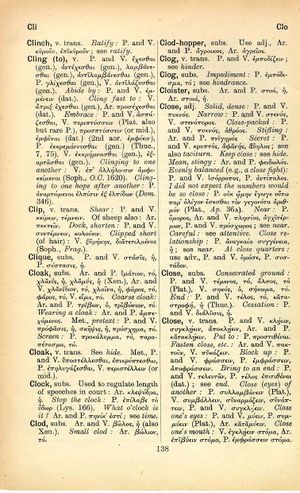clock: Difference between revisions
From LSJ
Ἔνιοι κακῶς φρονοῦσι πράττοντες καλῶς → Multi bonis in rebus haud sapiunt bene → Trotz ihres Wohlergehens denken manche schlecht
(CSV3) |
m (Woodhouse1 replacement) |
||
| Line 1: | Line 1: | ||
{{Woodhouse1 | {{Woodhouse1 | ||
|Text=[[File:woodhouse_138.jpg|thumb|link={{filepath:woodhouse_138.jpg}}]] | |Text=[[File:woodhouse_138.jpg|thumb|link={{filepath:woodhouse_138.jpg}}]] | ||
===substantive=== | |||
Used to regulate length of speeches in court: Ar. [[κλεψύδρα]], ἡ. | Used to regulate length of speeches in court: [[Aristophanes|Ar.]] [[κλεψύδρα]], ἡ. | ||
[[stop the clock]]: [[prose|P.]] [[ἐπίλαβε τὸ ὕδωρ]] (Lys. 166). | |||
[[what o'clock is it]]? [[Aristophanes|Ar.]] and [[prose|P.]] [[πηνίκ' ἐστί]]; see [[time]]. | |||
}} | }} | ||
Revision as of 08:56, 20 May 2020
English > Greek (Woodhouse)
substantive
Used to regulate length of speeches in court: Ar. κλεψύδρα, ἡ.
stop the clock: P. ἐπίλαβε τὸ ὕδωρ (Lys. 166).
what o'clock is it? Ar. and P. πηνίκ' ἐστί; see time.

